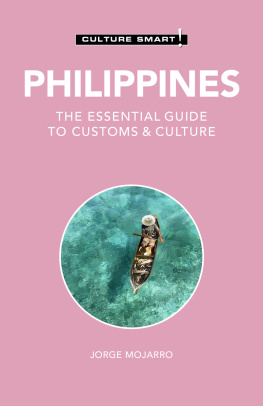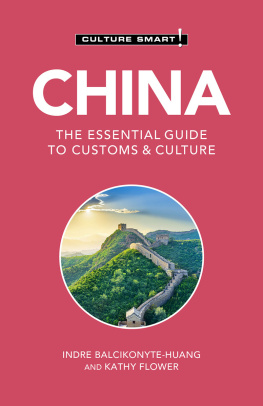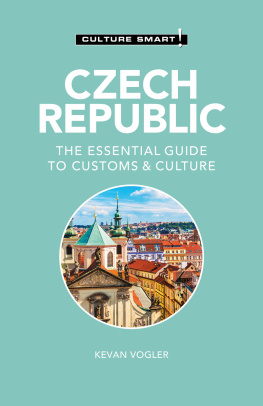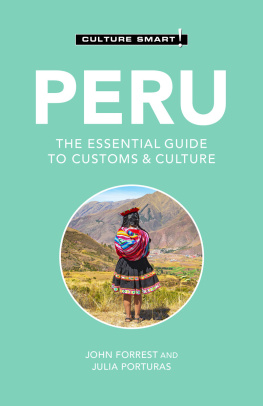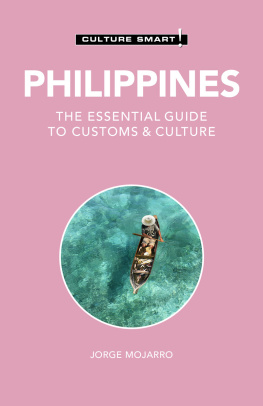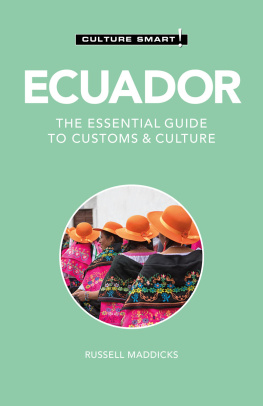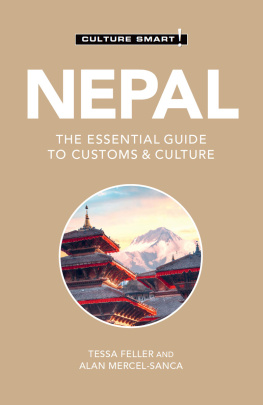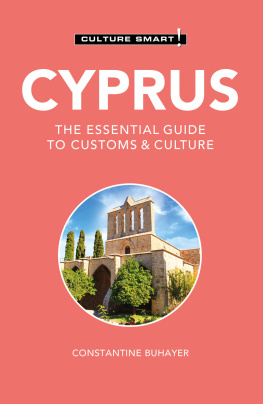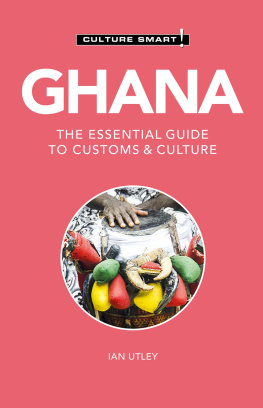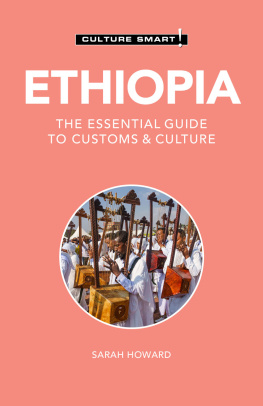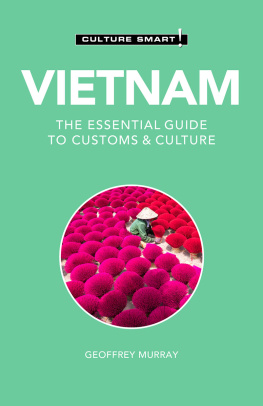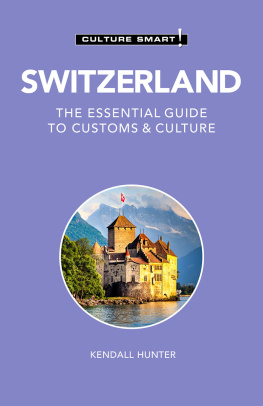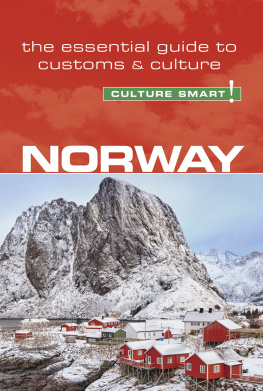Culture Smart! - Philippines--Culture Smart!
Here you can read online Culture Smart! - Philippines--Culture Smart! full text of the book (entire story) in english for free. Download pdf and epub, get meaning, cover and reviews about this ebook. year: 2021, publisher: Kuperard, genre: Home and family. Description of the work, (preface) as well as reviews are available. Best literature library LitArk.com created for fans of good reading and offers a wide selection of genres:
Romance novel
Science fiction
Adventure
Detective
Science
History
Home and family
Prose
Art
Politics
Computer
Non-fiction
Religion
Business
Children
Humor
Choose a favorite category and find really read worthwhile books. Enjoy immersion in the world of imagination, feel the emotions of the characters or learn something new for yourself, make an fascinating discovery.
- Book:Philippines--Culture Smart!
- Author:
- Publisher:Kuperard
- Genre:
- Year:2021
- Rating:5 / 5
- Favourites:Add to favourites
- Your mark:
- 100
- 1
- 2
- 3
- 4
- 5
Philippines--Culture Smart!: summary, description and annotation
We offer to read an annotation, description, summary or preface (depends on what the author of the book "Philippines--Culture Smart!" wrote himself). If you haven't found the necessary information about the book — write in the comments, we will try to find it.
Philippines--Culture Smart! — read online for free the complete book (whole text) full work
Below is the text of the book, divided by pages. System saving the place of the last page read, allows you to conveniently read the book "Philippines--Culture Smart!" online for free, without having to search again every time where you left off. Put a bookmark, and you can go to the page where you finished reading at any time.
Font size:
Interval:
Bookmark:
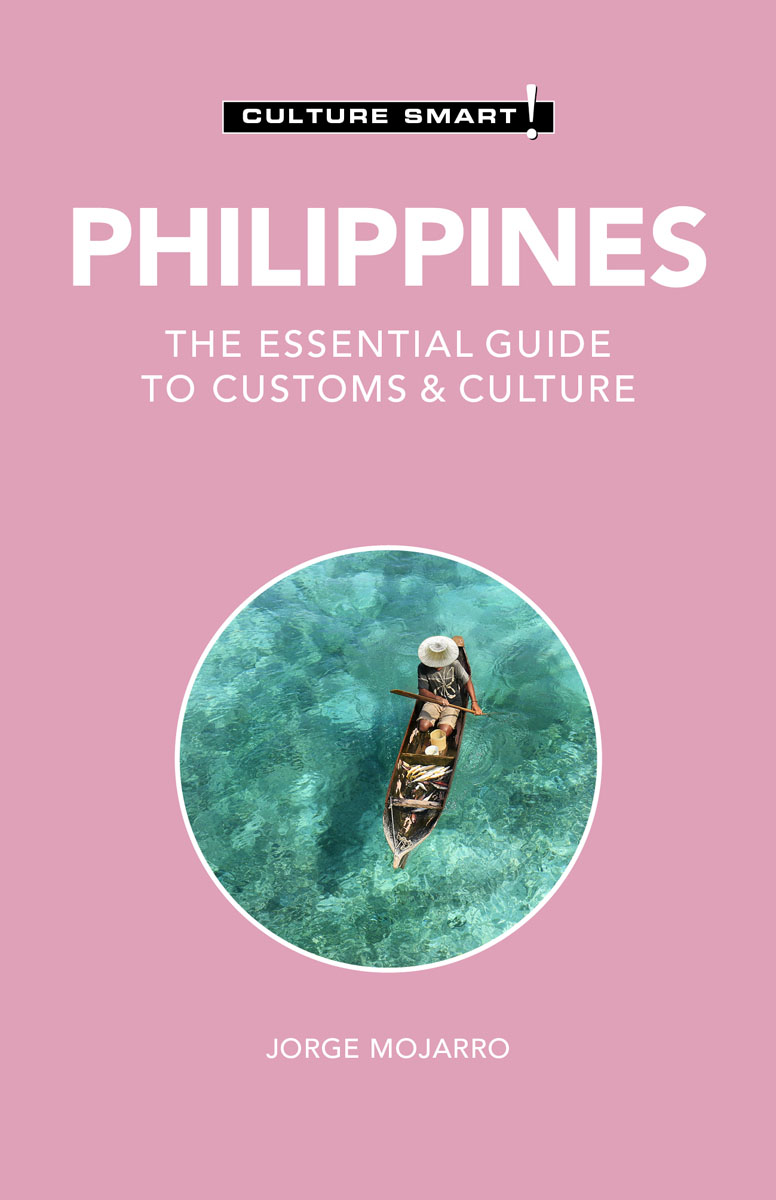
The real voyage of discovery consists not in seeking new landscapes, but in having new eyes.
Adapted from Marcel Proust, Remembrance of Things Past.
ISBN 978 1 78702 284 3
British Library Cataloguing in Publication Data
A CIP catalogue entry for this book is available from the British Library
First published in Great Britain
by Kuperard, an imprint of Bravo Ltd
59 Hutton Grove, London N12 8DS
Tel: +44 (0) 20 8446 2440
www.culturesmart.co.uk
Inquiries:
Design Bobby Birchall
Printed in Turkey
The Culture Smart! series is continuing to expand. All Culture Smart! guides are available as e-books, and many as audio books. For further information and latest titles visit www.culturesmart.co.uk
GRAHAM COLIN-JONES is British by birth, a linguist by training, and an international civil servant by profession. He has lived and worked for many years in Asian cultures, including fifteen years in the Philippines. He is currently a consultant editor for the Asian Development Bank, the World Bank, and the International Monetary Fund.
YVONNE QUAHE COLIN-JONES is Singaporean by birth, a sociologist by training, and a cross-cultural trainer, facilitator, and coach with a human resources background. She has lived in three continents and works with multicultural, globally mobile populations.
JORGE MOJARRO is a Spanish academic with a Ph.D. from Salamanca University who is teaching and researching at the University of Santo Tomas in Manila. He has traveled extensively through the Philippines and southeast Asia and has written for both scholarly and general publications, including Philippine newspapers such as Business World and The Manila Times.
COVID-19
The coronavirus pandemic of 2020 affected millions of people around the world, causing unprecedented social and economic disruption. As the impact of this global crisis continues to unfold, in many countries social norms are being challenged, and enduring changes will be reflected in future editions of Culture Smart! titles.

The Philippines, a scattered archipelago of seven thousand six hundred islands, appears to be one of the most Westernized countries in Asia. However, the realities of Filipino life are complex, and not immediately evident to the foreign visitor. Many Filipinos work abroad, far from home and their families, and this is of great significance, not only for the families themselves, but countrywide and internationally. Business is not carried out in quite the same way as in the West. There are social situations and ways of behaving that visitors might well misunderstand.
The Philippines has a unique colonial history, which has been described by its inhabitants as three centuries in the Convent and fifty years in Hollywoodit was governed by Spain for more than three hundred years and by the United States for fifty. As a result, certain Western beliefs are well entrenched and prevalent: 85 percent of Filipinos are Roman Catholics, the government is democratically elected, and freedom of speech and education are highly valued.
Underneath the Western veneer, however, lies an Asian soul. Filipinos share many values and attitudes with other Asian people, although the distinctive blend of East and West is subtle and can sometimes be difficult to fathom. The foreigner who fails to realize that the faade of the English language (in which most signs in Manila are written), fast food, pop music, and rich lawyers does not run deep will soon commit a faux pas that may have long-lasting effects.
Side by side with great wealth, much of the country lives in extreme poverty, although there have been substantial improvements during the last fifteen years, and there is now a growing middle class especially thanks to the business process outsourcing industry. Culture Smart! Philippines looks at the social, economic, and political problems that have brought this about. Despite their material disadvantages, the Filipino people show an amazing resilience. They are warm, charming, and welcoming. Beyond the chaotic traffic jams and heat of Manila there is so much to enjoy and appreciate in the Philippines that the open-minded visitor will be vastly enriched by the experience.
Culture Smart! Philippines also includes among its pages case studies, true stories, and advice on what to expect and how to behave in many different situations. First-time visitors and long-term foreign workers will find an abundance of practical information and key insights into Filipino society and business life that will enable them to make the very most of their time in this unique and intriguing country.
Official Name | Republika ng Pilipinas (Republic of the Philippines) | The Philippines is a member of the Asia-Pacific Economic Cooperation (APEC) and the Association of Southeast Asian Nations (ASEAN). |
Capital City | Manila (on the island of Luzon) | The metropolitan area is referred to as Metro Manila, or for administrative purposes the National Capital Region (NCR). Population nearly 14 million in Metro Manila |
Other Main Cities | Baguio (in Luzon); Cebu (in Visayas); Davao (in Mindanao) | |
Area | 115,800 sq. miles (300,000 sq. km) | 7,641 islands |
Climate | Tropical, with an average daily maximum temperature of 90 F (32C) | Summer, from March to May, is the dry season, with an av. daily max. temp. of 9295 F (3335C). |
Terrain | Primarily mountainous with narrow to extensive coastal lowlands | Coastline varies from rugged cliffs to sandy beaches. |
Population | Estimated at around 109 million in 2020 | Median age around 25.7 years |
Adult Literacy | Over 95% | Education is highly valued. |
Government | Republic since 1946. The current Constitution was promulgated in 1987. President elected for a single term of six years. | Senate of 24 members. 303 members in the House of Representatives |
Language | Filipino (national language); English (second official language) | Other languages: Cebuano, Ilonngo, Ilocano, Bicolano, Waray |
Religion | Approx. 85% Catholic; 5% Muslim; 5% Protestant; 5% others | |
Media | Several English newspapers are published as well as Filipino ones. | TV and radio stations in both languages |
Economy | GDP growth rate (2019): 6% GDP per capita (2019): US $3,200 | |
Currency | Philippine Peso (PHP or P) | 1$ = 48.5 Php (September 2020) |
Electricity |
Font size:
Interval:
Bookmark:
Similar books «Philippines--Culture Smart!»
Look at similar books to Philippines--Culture Smart!. We have selected literature similar in name and meaning in the hope of providing readers with more options to find new, interesting, not yet read works.
Discussion, reviews of the book Philippines--Culture Smart! and just readers' own opinions. Leave your comments, write what you think about the work, its meaning or the main characters. Specify what exactly you liked and what you didn't like, and why you think so.

